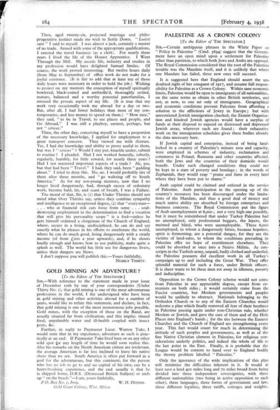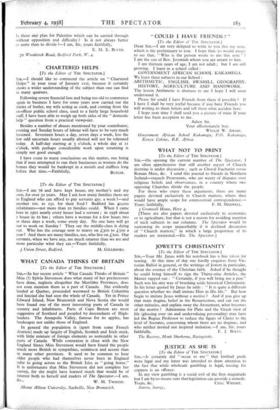PALESTINE AS A CROWN COLONY
[To the Editor of THE SPECTATOR.] SIR,—Certain ambiguous phrases in the White Paper on "Policy in Palestine" (Cmd. 5634) suggest that the Govern- ment have an open mind upon a settlement for Palestine other than partition, to which both Jews and Arabs are opposed. The Royal Commission considered that the root of the Palestine trouble was the Mandate itself, and it is unlikely that where one Mandate has failed, three new ones will succeed.
It is suggested here that England should assert the un- doubted right of her conquest of 1917, and assume full respon- sibility for Palestine as a Crown Colony. Within sane economic limits, Palestine would be open to immigrants of all nationalities, on the same terms as obtain in other British territories, and not, as now, to one set only of immigrants. Geographical and economic conditions prevent Palestine from affording a solution to the afflictions of Jewry in Europe ; but with unrestricted Jewish immigration checked, the Zionist Organisa- tion and kindred Jewish agencies would have a surplus of funds at their disposal to expend on distressed and depressed Jewish areas, wherever such are found ; their exhaustive work on the immigration schedules gives these bodies already the data necessary here.
If Jewish capital and enterprise, instead of being land- locked in a ceuntry of Palestine's minute area and capacity, were employed in schemes of industry, reclamation and commerce in Poland, Rumania and other countries affected, both the Jews and the countries of their domicile would benefit. Under such changed conditions they could not be kept in a state of poverty and bondage ; in the words of Zephaniah, they would reap "praise and fame in every land where they have been put to shame."
Arab capital could be claimed and enlisted in the service of Palestine. Arab participation in the opening up of the country's resources has been discouraged under the limita- tions of the Mandate, and thus a good deal of money and much native ability are absorbed by foreign enterprises and business concerns. The Royal Commission put the figure of Arab unemployment at 6,000 ; not a very high one possibly, but it must be remembered that under Turkey Palestine had no unemployed, only professional beggars, the lepers, the maimed and blind, who were unemployable. These 6,000 unemployed, in whom a dangerously bitter, because hopeless, spirit is fermenting, are a potential danger, for they are the victims of land-sales, to whom the conditions prevailing in Palestine offer no hope of resettlement elsewhere. They could be absorbed at once into a Native Militia. As con- scripts in the Turkish army, unpaid, badly clothed and underfed, the Palestine peasants did excellent work in all Turkey's campaigns up to and including the Great War. They offer splendid material for such a force, under British officers. It is sheer waste to let these men rot away in idleness, poverty and indiscipline.
Opposition to the Crown Colony scheme would not come from Palestine in any appreciable degree, except from ex- tremists on both sides ; it would certainly come from the Fascist countries, but Moslem governments and peoples would be unlikely to obstruct. Nationals belonging to the Orthodox Church or to any of the Eastern Churches would welcome a plan which finally removed all fear of their brethren in Palestine passing again under non-Christian rule, whether Moslem or Jewish, and gave the care of them and of the Holy Places into England's hands ; for the ties between the Eastern Churches and the Church of England are strengthening every year. This fact would count for much in determining the attitude of such peoples and governments, as well as of the fine Native Christian element in Palestine, for religious con- siderations underly politics, and indeed the whole of life to the last point in the. East. Finally, it is probable that the League would be content to hand over to England bodily the thorny problem labelled "Palestine."
Only the ignorance of the wide implications of this plan will minimise the difficulties inherent in it. It would at least save a land 400 miles long and 70 miles broad from being divided into ' three independent sovereignties, with three different nationalities (two being in active opposition to each other), three languages, three forms of government and law, three different loyalties, three tariffs, coinages and weights.
Is there any plan for Palestine which can be carried through • without opposition and difficulty ? Is it not always better to unite than to divide ?—I am, Sir, yours faithfully, . E. M. E. BLYrif.
70 Woodstock Road, Bedford Park, IV. 4.















































 Previous page
Previous page